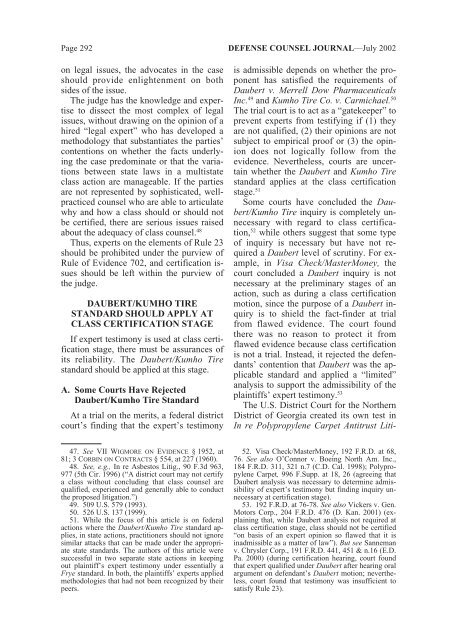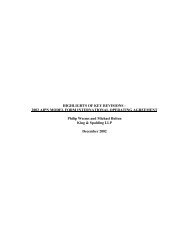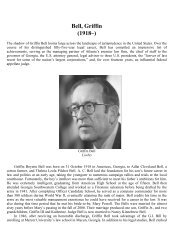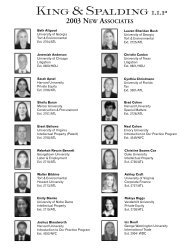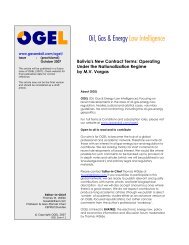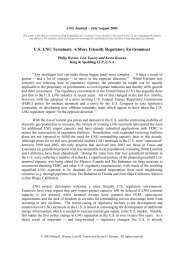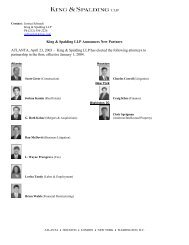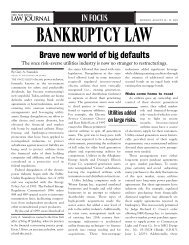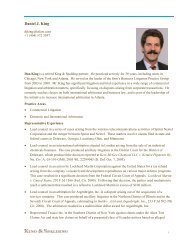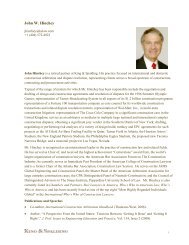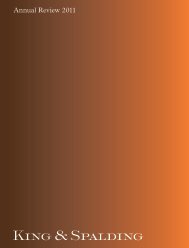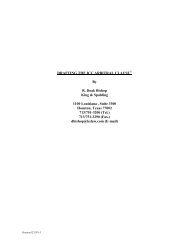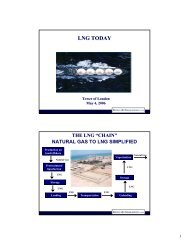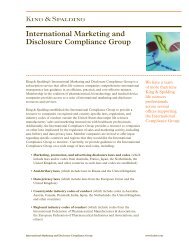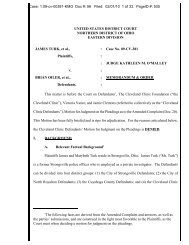Use and Misuse of Expert Opinions at the Class ... - King & Spalding
Use and Misuse of Expert Opinions at the Class ... - King & Spalding
Use and Misuse of Expert Opinions at the Class ... - King & Spalding
You also want an ePaper? Increase the reach of your titles
YUMPU automatically turns print PDFs into web optimized ePapers that Google loves.
Page 292 DEFENSE COUNSEL JOURNAL—July 2002<br />
on legal issues, <strong>the</strong> advoc<strong>at</strong>es in <strong>the</strong> case<br />
should provide enlightenment on both<br />
sides <strong>of</strong> <strong>the</strong> issue.<br />
The judge has <strong>the</strong> knowledge <strong>and</strong> expertise<br />
to dissect <strong>the</strong> most complex <strong>of</strong> legal<br />
issues, without drawing on <strong>the</strong> opinion <strong>of</strong> a<br />
hired “legal expert” who has developed a<br />
methodology th<strong>at</strong> substanti<strong>at</strong>es <strong>the</strong> parties’<br />
contentions on whe<strong>the</strong>r <strong>the</strong> facts underlying<br />
<strong>the</strong> case predomin<strong>at</strong>e or th<strong>at</strong> <strong>the</strong> vari<strong>at</strong>ions<br />
between st<strong>at</strong>e laws in a multist<strong>at</strong>e<br />
class action are manageable. If <strong>the</strong> parties<br />
are not represented by sophistic<strong>at</strong>ed, wellpracticed<br />
counsel who are able to articul<strong>at</strong>e<br />
why <strong>and</strong> how a class should or should not<br />
be certified, <strong>the</strong>re are serious issues raised<br />
about <strong>the</strong> adequacy <strong>of</strong> class counsel. 48<br />
Thus, experts on <strong>the</strong> elements <strong>of</strong> Rule 23<br />
should be prohibited under <strong>the</strong> purview <strong>of</strong><br />
Rule <strong>of</strong> Evidence 702, <strong>and</strong> certific<strong>at</strong>ion issues<br />
should be left within <strong>the</strong> purview <strong>of</strong><br />
<strong>the</strong> judge.<br />
DAUBERT/KUMHO TIRE<br />
STANDARD SHOULD APPLY AT<br />
CLASS CERTIFICATION STAGE<br />
If expert testimony is used <strong>at</strong> class certific<strong>at</strong>ion<br />
stage, <strong>the</strong>re must be assurances <strong>of</strong><br />
its reliability. The Daubert/Kumho Tire<br />
st<strong>and</strong>ard should be applied <strong>at</strong> this stage.<br />
A. Some Courts Have Rejected<br />
Daubert/Kumho Tire St<strong>and</strong>ard<br />
At a trial on <strong>the</strong> merits, a federal district<br />
court’s finding th<strong>at</strong> <strong>the</strong> expert’s testimony<br />
is admissible depends on whe<strong>the</strong>r <strong>the</strong> proponent<br />
has s<strong>at</strong>isfied <strong>the</strong> requirements <strong>of</strong><br />
Daubert v. Merrell Dow Pharmaceuticals<br />
Inc. 49 <strong>and</strong> Kumho Tire Co. v. Carmichael. 50<br />
The trial court is to act as a “g<strong>at</strong>ekeeper” to<br />
prevent experts from testifying if (1) <strong>the</strong>y<br />
are not qualified, (2) <strong>the</strong>ir opinions are not<br />
subject to empirical pro<strong>of</strong> or (3) <strong>the</strong> opinion<br />
does not logically follow from <strong>the</strong><br />
evidence. Never<strong>the</strong>less, courts are uncertain<br />
whe<strong>the</strong>r <strong>the</strong> Daubert <strong>and</strong> Kumho Tire<br />
st<strong>and</strong>ard applies <strong>at</strong> <strong>the</strong> class certific<strong>at</strong>ion<br />
stage. 51<br />
Some courts have concluded <strong>the</strong> Daubert/Kumho<br />
Tire inquiry is completely unnecessary<br />
with regard to class certific<strong>at</strong>ion,<br />
52 while o<strong>the</strong>rs suggest th<strong>at</strong> some type<br />
<strong>of</strong> inquiry is necessary but have not required<br />
a Daubert level <strong>of</strong> scrutiny. For example,<br />
in Visa Check/MasterMoney, <strong>the</strong><br />
court concluded a Daubert inquiry is not<br />
necessary <strong>at</strong> <strong>the</strong> preliminary stages <strong>of</strong> an<br />
action, such as during a class certific<strong>at</strong>ion<br />
motion, since <strong>the</strong> purpose <strong>of</strong> a Daubert inquiry<br />
is to shield <strong>the</strong> fact-finder <strong>at</strong> trial<br />
from flawed evidence. The court found<br />
<strong>the</strong>re was no reason to protect it from<br />
flawed evidence because class certific<strong>at</strong>ion<br />
is not a trial. Instead, it rejected <strong>the</strong> defendants’<br />
contention th<strong>at</strong> Daubert was <strong>the</strong> applicable<br />
st<strong>and</strong>ard <strong>and</strong> applied a “limited”<br />
analysis to support <strong>the</strong> admissibility <strong>of</strong> <strong>the</strong><br />
plaintiffs’ expert testimony. 53<br />
The U.S. District Court for <strong>the</strong> Nor<strong>the</strong>rn<br />
District <strong>of</strong> Georgia cre<strong>at</strong>ed its own test in<br />
In re Polypropylene Carpet Antitrust Liti-<br />
47. See VII WIGMORE ON EVIDENCE § 1952, <strong>at</strong><br />
81; 3 CORBIN ON CONTRACTS § 554, <strong>at</strong> 227 (1960).<br />
48. See, e.g., In re Asbestos Litig., 90 F.3d 963,<br />
977 (5th Cir. 1996) (“A district court may not certify<br />
a class without concluding th<strong>at</strong> class counsel are<br />
qualified, experienced <strong>and</strong> generally able to conduct<br />
<strong>the</strong> proposed litig<strong>at</strong>ion.”)<br />
49. 509 U.S. 579 (1993).<br />
50. 526 U.S. 137 (1999).<br />
51. While <strong>the</strong> focus <strong>of</strong> this article is on federal<br />
actions where <strong>the</strong> Daubert/Kumho Tire st<strong>and</strong>ard applies,<br />
in st<strong>at</strong>e actions, practitioners should not ignore<br />
similar <strong>at</strong>tacks th<strong>at</strong> can be made under <strong>the</strong> appropri<strong>at</strong>e<br />
st<strong>at</strong>e st<strong>and</strong>ards. The authors <strong>of</strong> this article were<br />
successful in two separ<strong>at</strong>e st<strong>at</strong>e actions in keeping<br />
out plaintiff’s expert testimony under essentially a<br />
Frye st<strong>and</strong>ard. In both, <strong>the</strong> plaintiffs’ experts applied<br />
methodologies th<strong>at</strong> had not been recognized by <strong>the</strong>ir<br />
peers.<br />
52. Visa Check/MasterMoney, 192 F.R.D. <strong>at</strong> 68,<br />
76. See also O’Connor v. Boeing North Am. Inc.,<br />
184 F.R.D. 311, 321 n.7 (C.D. Cal. 1998); Polypropylene<br />
Carpet, 996 F.Supp. <strong>at</strong> 18, 26 (agreeing th<strong>at</strong><br />
Daubert analysis was necessary to determine admissibility<br />
<strong>of</strong> expert’s testimony but finding inquiry unnecessary<br />
<strong>at</strong> certific<strong>at</strong>ion stage).<br />
53. 192 F.R.D. <strong>at</strong> 76-78. See also Vickers v. Gen.<br />
Motors Corp., 204 F.R.D. 476 (D. Kan. 2001) (explaining<br />
th<strong>at</strong>, while Daubert analysis not required <strong>at</strong><br />
class certific<strong>at</strong>ion stage, class should not be certified<br />
“on basis <strong>of</strong> an expert opinion so flawed th<strong>at</strong> it is<br />
inadmissible as a m<strong>at</strong>ter <strong>of</strong> law”). But see Sanneman<br />
v. Chrysler Corp., 191 F.R.D. 441, 451 & n.16 (E.D.<br />
Pa. 2000) (during certific<strong>at</strong>ion hearing, court found<br />
th<strong>at</strong> expert qualified under Daubert after hearing oral<br />
argument on defendant’s Daubert motion; never<strong>the</strong>less,<br />
court found th<strong>at</strong> testimony was insufficient to<br />
s<strong>at</strong>isfy Rule 23).


